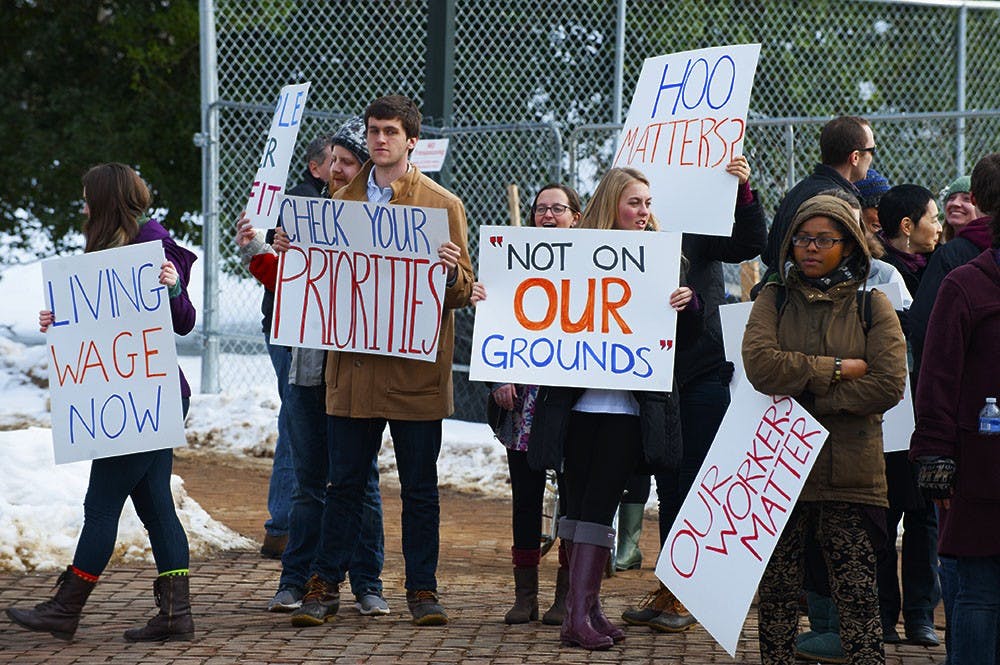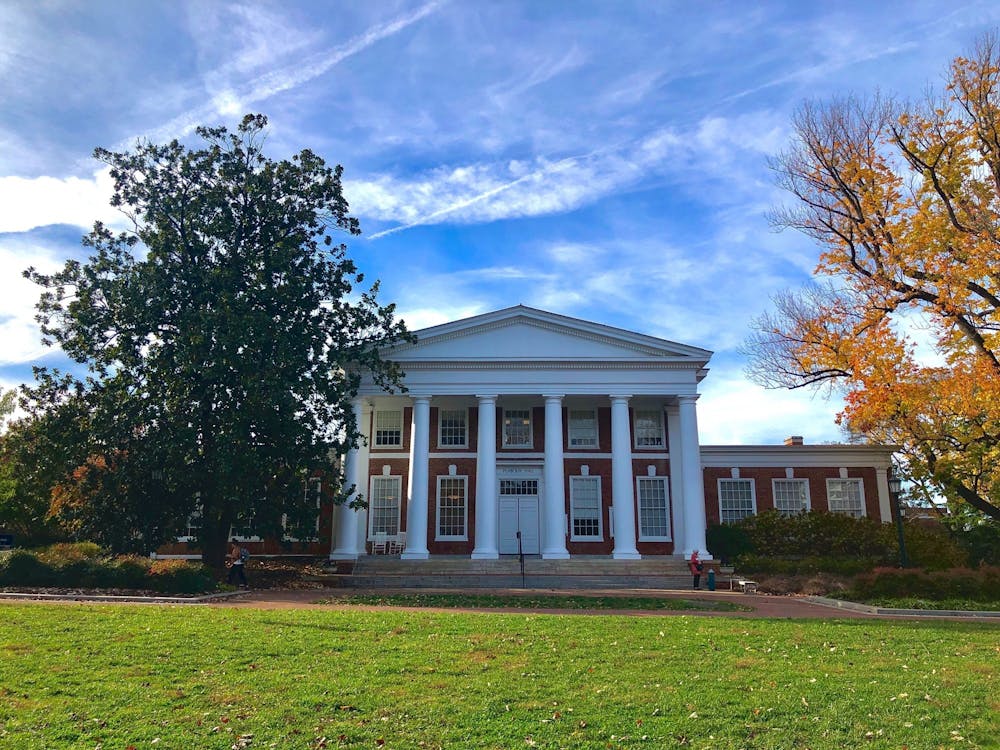Update
The University’s Living Wage Campaign held a rally Thursday demanding all University workers receive a living wage. The ralliers marched to Madison Hall to deliver a petition signed by more than 1,200 individuals.
In addition to making the case for instituting a living wage for all University workers, the petition calls for administration to schedule a meeting between Students United for a Living Wage members, legal officials and University administration senior members responsible for overseeing budgets and finances, and for an increase in oversight of contracted corporations by officially auditing University contractors.
First-year College student Jenneca Graber-Grace helped plan the rally and said workers at the University are not receiving enough pay to sustain a good standard of life.
“The work performed by these hard working people is critical to the way our University runs, yet members of our administration turn a blind eye to their treatment and compensation,” Graber-Grace said. “Currently the poverty rate in Charlottesville is a staggering 27.5 percent. As the largest employer in Charlottesville, the University, holds exceptional power over the city’s economic health.”
Minimum wage rates in select U.S. CitiesFourth-year College student Caitlin Levine spoke about what she said is the University’s pursuit of profit at the expense of its workers.
“I feel infuriated because our public University cares more about making money than it does about your favorite dining hall worker, about the mother who cleans your dorm bathroom, about the father who gets to the Chemistry building at six in the morning to make sure that your classrooms are in tip-top shape,” Levine said. “They care more about profit than those human beings.”
University spokesperson Matthew Charles said the University has established its own “minimum hiring rate,” which has increased by 2 percent annually for the past several years.
“With the increase scheduled for later this year, the minimum hiring rate will have increased by 18.5 percent since the Presidential commitment was made, or 3.7 percent per year over the past five years,” Charles said in an email. “This compares to the one state-granted increase for Classified Staff during this same timeframe of 2 percent plus longevity bonuses effective November 2013.”
English Prof. Susan Fraiman helped launch the Living Wage campaign when it began in 1998. She said the campaign serves to work alongside other activist groups, instead of attempting to address all issues independently.
“In light of recent events, it might seem that ‘wagers’ should step back and allow the spotlight to remain on the important issue of sexual assault,” Fraiman said. “In fact, the opposite is true. The living wage campaign is an invaluable resource, an indispensable coalition partner for any group concerned with social justice issues on this campus.”
Fraiman also said activist groups must work together in order to sustain a culture of activism at the University by providing support and serving as coalition partners.
“Now is the time for everyone concerned with changing the climate for women and for workers, now is the time for all of us to get involved,” Fraiman said. “The categories of women and workers are not mutually exclusive. Low-waged staff are disproportionately female.”
Arts and Sciences graduate student Laura Goldblatt said the campaign wants to make sure students are aware of what is happening on Grounds, and to raise workers’ wages.
“We want to let the administration and the Board of Visitors know that there are a lot of people on campus, in the surrounding community and among the alumni who support the University doing what’s right, and paying its workers a living wage,” Goldblatt said.
Living Wage Campaign History at the University
Fraiman has been involved with the fight for a living wage at the University for nearly two decades. She said the movement largely emerged out of the Labor Action Group, a coalition of faculty, students and community members. Initially, faculty discussed the issue with students — what she called a “Teach-In with the Labor Movement.”
“We brought together some amazing labor activists and scholars — Julian Bond, [then-]AFL-CIO Secretary-Treasurer Richard Trumka, Barbara Ehrenreich, among others — who helped to make it a very successful teach-in,” Fraiman said.
The success of the teach-in led Fraiman and others to think about where the organization should go from there in order to make a meaningful difference and spurred them to officially launch the Living Wage Campaign on April 15, 1998.
“When we started the campaign — modeled on successful efforts in municipalities such as Baltimore — we were the first such campaign on a college campus aimed at raising the wages of University employees,” Fraiman said.
At the time, a living wage would have been $8, she said. Instead of receiving this wage rate, Fraiman said much of the University’s predominantly African-American staff received wages below the federal poverty line. In order to protest the wages they received, the Living Wage Campaign encouraged people to wear buttons advertising the need for a living wage.
Soon afterwards, as employees began to wear the buttons, a member of the University staff was actually sent home. The Labor Action Group defended her right to free speech, and the Living Wage Campaign demonstrated its support by raising consciousness of the staffer’s breach of rights.
“The University did not respond, but the city was actually extremely receptive,” Fraiman said. “They realized that they were not paying their own workers a living wage, and in 2000, Charlottesville declared itself a Living Wage City.”
The Living Wage Campaign seemed to have some success, and in Nov. 2000, the University raised the minimum starting wage of staffers from $6.50 to $8.19, functionally implementing a living wage.
However, because of general economic inflation and increases in the cost of living, the $8 wage quickly fell below the standards of a living wage. In 2002, the University staff formed a union affiliated with the Communication Workers of America. The Living Wage Campaign then saw a four-year lull, which ended with a student-led sit-in in Minor Hall. Fraiman said the sit-in led to multiple arrests but again increased workers’ wages.
“In April of 2006, there was a sit-in resulting in a number of student arrests — one faculty member was arrested as well,” Fraiman said. “By no coincidence, that summer staff wages got a bump up…While the University claims their actions are not influenced by the movement, the timing of significant wage increases would seem to belie that claim.”
The most recent incarnation of the Living Wage Campaign began in 2010 when current University President Teresa Sullivan took office. Fraiman said she and others were inspired by Sullivan’s background in labor sociology. Fraiman cited a textbook written by Sullivan — “The Social Organization of Work” — which says that “being paid a living wage for one’s work is a necessary condition for self-actualization.”
However, when approached by the Living Wage Campaign, Fraiman said Sullivan was not receptive of the group’s concerns.
Charles, however, noted continued efforts from the administration in spite of insufficient government funding on employees' salaries.
“Despite the challenges in the Commonwealth of Virginia, in April 2011, the President made a commitment to improve the salaries of the lowest-paid employees at U.Va.,” Charles said. “And meaningful action has been taken ever since to support that commitment.”
In the last seven years, Charles said, the University has only received one pay increase from the General Assembly. Over the past 20 years state support for the Academic Division has decreased from 33 percent to 10 percent.
While a recent report from the state Department of Human Resource Management shows nearly four percent of the state workforce living below the federal poverty level of $23,850 for a family of four, Charles said no University employees are in that category.
Charles emphasized existing University programs designed to supplement and augment an employee's pay.
"The University has developed programs specifically designed to build skills and salaries for those in entry level, typically lower-paid positions, specifically housekeeping, recycling, landscaping and security guards," Charles said.
The University also offers a career development program and Supplemental Benefit Credit for individual salary enhancements.
“University Staff with salaries below $42,000 receive a $450/year salary supplement that equates to another $0.22 an hour in take home pay,” Charles said. “This ‘Supplemental Benefit Credit’ offsets the employee’s cost of benefits,” such as health insurance premiums, retirement, parking and gym membership.
However, more recent efforts from the Living Wage Campaign have gone without action from the administration.
After receiving no response to more than 325 petitions sent to the administration, students involved in the Living Wage Campaign led a hunger strike in 2012, lasting from Feb. 18 to March 1. One of the organizers, graduate College student David Flood said the group did not originally want to conduct a hunger strike but felt it was necessary due to the lack of administrative attention.
“We didn’t want to do the hunger strike,” Flood said. “We had indicated to the faculty that it would escalate if they weren’t willing to cooperate. We wanted to have an action that was legal that garnered attention and publicity and that the University would not be able to halt.”
The strike received all kinds of publicity, which Flood said was partly due to the participation of a University football player, Joseph Williams. Flood said even Sports Illustrated covered the two-week-long strike.
Flood said participating students, while maintaining their coursework, would meet in the morning and stand in front of the Rotunda for most of the day.
Fraiman said she remembered the strike well and was extremely proud of the actions they took to bring attention to the need for a living wage.
“It was barely spring, and these incredibly brave students would be out there with four coats because they couldn’t maintain warmth,” Fraiman said.
The University made no response to the Living Wage Campaign’s 2012 efforts and has not increased its base-rate wage since 2006.






